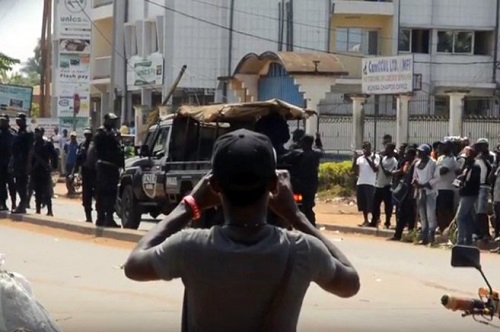AFP photo
By
Amnesty International
More than 500 people have been detained in overcrowded prisons following mass arrests in English-speaking regions of Cameroon, whilst eye-witnesses have told human rights NGO Amnesty International that wounded protestors are abandoning hospital treatment to avoid capture.
Mass arrests are continuing in the regions following protests in dozens of towns in Northwest and Southwest Cameroon on 1 October, where more than 20 people were unlawfully shot dead by security forces.
In a facility run by a mobile police unit in Buea, the capital of the Southwest region, detainees have been described as being “packed like sardines”.
Amnesty has been told by medics that dozens of wounded protestors have fled hospitals, despite the risk they will die from their injuries, for fear of arrest.
Ilaria Allegrozzi, Amnesty International’s Lake Chad researcher, said:
“The climate of fear in the Anglophone regions could lead to even more people dying of their wounds, too scared to seek the medical treatment they so desperately need.
“The security forces should put an end to the arbitrary arrest of protestors and permit that those injured are able to seek treatment without fear.
“This mass arrest of protestors, most of whom were acting peacefully, is not only a violation of human rights, but is also likely to be counter-productive.
“The Cameroonian authorities should release anyone detained only for exercising their right to peaceful protest.”
Shot dead outside hospital
Amnesty has evidence that in at least nine hospitals, people with serious injuries fled before their treatment had finished fearing arrest.
A young man who was left with multiple fractures after being shot in both legs by the armed forces was taken home before he could be stabilised. According to the doctor who treated him: “He had lost more than a litre of blood. I do not know whether he is still alive, he may likely die”.
A medic told Amnesty that “some of our patients run away from hospital even before getting stabilised, out of fear that the police would come to arrest them”, whilst another described how security forces did not allow him and other medical staff to examine the corpses to clinically confirm that they had been shot.
In one case, a young man was killed just outside a hospital, shot in the back of the head by security forces whilst running away. Bullets hit the walls of the hospital and penetrated a room where a doctor and nurses were operating.
Prison overcrowding, bribes and teargas
Eyewitnesses have described prison overcrowding following the wave of arrests. In Buea, the prison population has soared from about 1,000 detainees before 22 September to around 1,500 today. Some of those arrested have been charged with secession, while others have been charged with not possessing identity papers, destruction of public property or failure to respect order of the governor. Some have already been brought before the courts, while others were released following the payment of bribes, with families in Buea reporting to have paid police approximately £45 per family member.
The arrests have taken place in towns across the regions. Since the 1 October protests, at least 200 people have been arrested in Bamenda, the capital of the Northwest region, and the majority have been transferred to a prison in Bafoussam. In Buea, at least 300 people have been arrested, including a series of mass arbitrary arrests between 6 and 8 October. On Sunday 8 October, police arrested up to 100 people walking to a church in Buea, including church staff. Some have now been released.
Security forces, including the army, have used unnecessary or excessive force when making arrests, destroyed property and looted belongings. In one incident on 3 October in Buea, a police officer threw a teargas canister into a vehicle containing a dozen protestors, who had to smash the window for oxygen. In all the cases documented by Amnesty, arrests were carried out without warrants.
Background
Activists in Cameroon’s restless English-speaking regions are calling for its independence from the majority French-speaking nation. Cameroon’s divide has its roots in the end of World War One, when the League of Nations divided the former German colony of Kamerun between the allied French and British victors.
Amnesty International is a non-governmental organisation focused on human rights with over 7 million members and supporters around the world. The stated objective of the organisation is “to conduct research and generate action to prevent and end grave abuses of human rights, and to demand justice for those whose rights have been violated.”



No Comments Yet!
You can be first to comment this post!